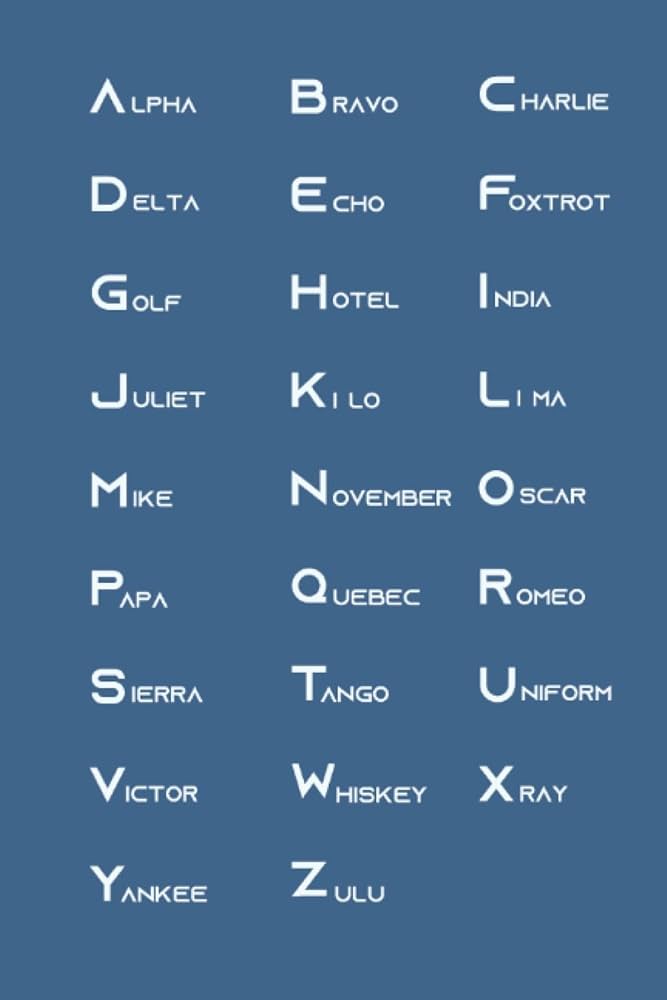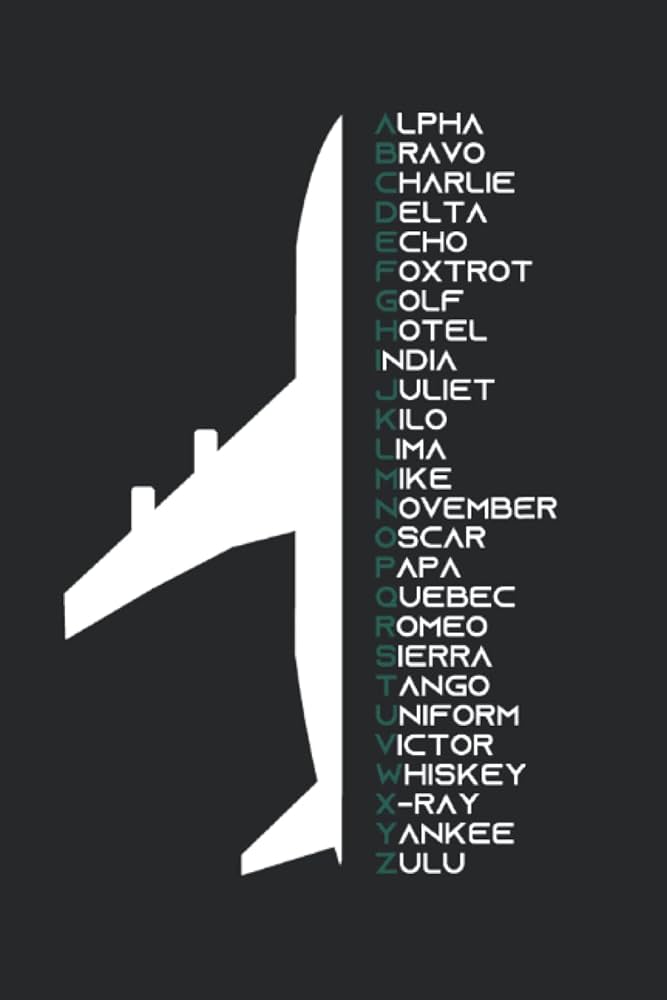Alpha beta charlie delta echo foxtrot golf hotel india

Alpha, Bravo, Charlie, Delta, Echo, Foxtrot, Golf, Hotel, India, Juliet, Kilo, Lima, Mike, November, Oscar, Papa, Quebec, Romeo, Sierra, Tango, Uniform. High quality Alfa Bravo Alpha beta charlie delta echo foxtrot golf hotel india Delta Echo Foxtrot Golf Hotel India Juliett Kilo Lima Mike November Oscar Papa Quebec Romeo Sierra Tango Uniform Victor. Nato Phonetic Alphabet Alpha Bravo Charlie Delta Echo Foxtrot Golf Hotel India Juliet Kilo Lima Mike t-shirt. Categories Hobbies, Lifestyle, BlackStyle. Alfa, Bravo, Charlie, Delta, Echo, Foxtrot, Golf, Hotel, India, Juliett, Kilo, Lima, Mike, November, Oscar, Papa, Quebec, Romeo, Sierra.
NATO Phonetic Alphabet
In the wake of this research, as well as the feedback from all ICAO Member States, and in consultation with communication specialists, the new ICAO phonetic alphabet was adopted and integrated into the Aeronautical Telecommunications Annex 10 for application in civil aviation. The words that represented the letters C, M, N, U, and X were substituted, and the final version was approved by the Organization on March 1, Aviation Explained Aviation History.
Glossary of the Phonetic Alphabet used in aviation Have a look at how the aviation phonetic alphabet can be used to convey messages including Morse code. Sign Up for Our Newsletters Get notified of the hottest news. By checking this box, you confirm that you have read and agree to our Privacy Policy and Terms of Use.
Related Posts. Aircraft Aviation History. Since that momentous…. Aviation History. If it's a British passport, you're British. Sheesh, Bun, don't you know anything. Some were used more often than others, in diffeent pin numbering schemes. That should be "How do you know. Are you British. I know because The British would have no reason to put an 'eee' sound before the 'zed' when naming that letter.
Only by heritage. I'm still waiting for the first five I asked for. The old US military phonetic used "Roger. Alpha beta charlie delta echo foxtrot golf hotel india The single-letter meaning for Roger was "I understand or have received your message," as in "Roger, wilco" I understand and will comply. This has gone into mariners' language and probably other folks' as well in such expressions as "Yeah, roger," or "Roger that," meaiing"You betcha.
Several common errors occur in this setting. One of the most glaring is "Over and Out. No reply is necessary. Not so. While you might argue that 'wilco', which is an abbreviation of 'will comply', contains an implicit 'I understand', as well as an implicit 'message received', it is by no means explicit in the term 'wilco'.
While just 'out' would do the trick, 'over and out' makes it clear that the person on the other end is free to have the last word. I wouldn't call it an error. There is no redundance at all, at least not in standard NATO military radio voice procedure - the usage in some national military and civilian organizations may differ. These are two separate responses. A commander receiving an order to move his troops could reply "wilco".
If the same order was received by his signaller the reply would be "roger", because the signaller does not have the authority to comply.  All such words known as prowords in radio voice procedure have very specific meanings. The French equivalent is "a vous", while the Italian and Spanish equivalent is "cambio" - the meaning is clear. As Armond writes, no reply is necessary.
All such words known as prowords in radio voice procedure have very specific meanings. The French equivalent is "a vous", while the Italian and Spanish equivalent is "cambio" - the meaning is clear. As Armond writes, no reply is necessary.
John L. My comments are based on stand radio procedure. Taking a slightly broader view, I don't imagine this is too great a problem. Surely within the fraternity of radio communications professionals there are subsets similar to those in a. There's probably even a "Radio Neil. We often say and hear a modification like "roger, out.
I am ending this communication and expect no further reply. If we were to have a list of least favourite words to parallel the current favourites list, mine would without hesitation be "judgemental". A few notes: First, "list" usually implies more than one entry. Second, my list would start with "Ugh. Fourth, I'm not being judgmental.
Yes it would be if it were. As it is, it is a set phrase, in use for scores of years by military and other radio users. Decoded, "over and out" means "It is your turn to speak but I'm not going to listen. Often used is 'Roger and Out to you'. Meaning 'Received and finished with you', but continuing with another station.
Regardless of the etymology of "wilco", it was the rule in the US military, back when I was on active duty at about the same time as Sherman, Burnside, and Grant , that "wilco" meant "I have understood and will comply. Prior to , three and five had been pronounced with the English consonants, but as two syllables. For direction presented as the hour-hand position on a clock, "ten", "eleven" and "twelve" may be used with "o'clock".
Both authorities indicate that a non-rhotic pronunciation is standard. That of the ICAO, first published in and reprinted many times without correction vd. The DIN consolidated all six into the single low-central vowel [a]. The DIN also reduced the number of stressed syllables in bravo and x-ray , consistent with the ICAO English respellings of those words and with the NATO change of spelling of x-ray to xray so that people would know to pronounce it as a single word.
There is no authoritative IPA transcription of the digits. However, there are respellings into both English and French, which can be compared to clarify some of the ambiguities and inconsistencies. Others are: 'colon', 'semi-colon', 'exclamation mark', 'question mark', 'apostrophe', 'quote' and 'unquote'. Prior to World War I and the development and widespread adoption of two-way radio that supported voice, telephone spelling alphabets were developed to improve communication on low-quality and long-distance telephone circuits.
The experience gained with that alphabet resulted in several changes being made during by the ITU. Throughout World War II, many nations used their own versions of a spelling alphabet. The U. At least two of the terms are sometimes still used by UK civilians to spell words over the phone, namely F for Freddie and S for Sugar.
To enable the U. Us open leaderboard today The CCB alphabet itself was based on the U. Army Field Manuals in the series. Several of these documents had revisions, and were renamed. Major F. Handy, directorate of Communications in the Army Air Force and a member of the working committee of the Combined Communications Board , enlisted the help of Harvard University's Psycho-Acoustic Laboratory, asking them to determine the most successful word for each letter when using "military interphones in the intense noise encountered in modern warfare.
According to a report on the subject:. The results showed that many of the words in the military lists had a low level of intelligibility, but that most of the deficiencies could be remedied by the judicious selection of words from the commercial codes and those tested by the laboratory.
In a few instances where none of the words could be regarded as especially satisfactory, it was believed possible to discover suitable replacements. Other words were tested and the most intelligible ones were compared with the more desirable lists. After World War II, with many aircraft and ground personnel from the allied armed forces, "Able Baker" was officially adopted for use in international aviation.
However, many sounds were unique to English, so an alternative "Ana Brazil" alphabet was used in Latin America. After further study and modification by each approving body, the revised alphabet was adopted on 1 November , to become effective on 1 April for civil aviation but it may not have been adopted by any military.
Problems were soon found with this list. Some users believed that they were so severe that they reverted to the old "Able Baker" alphabet. Confusion among words like Delta and Extra , and between Nectar and Victor , or the poor intelligibility of other words during poor receiving conditions were the main problems. Later in , ICAO decided to revisit the alphabet and their research.
To identify the deficiencies of the new alphabet, testing was conducted among speakers from 31 nations, principally by the governments of the United Kingdom and the United States. Among the more interesting of the research findings was that "higher noise levels do not create confusion, but do intensify those confusions already inherent between the words in question".
By early the ICAO was nearly complete with this research, and published the new official phonetic alphabet in order to account for discrepancies that might arise in communications as a result of multiple alphabet naming systems coexisting in different places and organizations. Air Force research. After all of the above study, only the five words representing the letters C, M, N, U, and X were replaced.
It was finally adopted by the IMO in In the official version of the alphabet, [4] two spellings deviate from the English norm: Alfa and Juliett. Alfa is spelled with an f as it is in most European languages because the spelling Alpha may not be pronounced properly by native speakers of some languages — who may not know that ph should be pronounced as f.
The spelling Juliett is used rather than Juliet for the benefit of French speakers, because they may otherwise treat a single final t as silent. For similar reasons, Charlie and Uniform have alternative pronunciations where the ch is pronounced "sh" and the u is pronounced "oo". Early on, the NATO alliance changed X-ray to Xray in its version of the alphabet to ensure that it would be pronounced as one word rather than as two, [35] while the global organization ICAO keeps the spelling X-ray.
For the and phonetics, each transmission of figures is preceded and followed by the words "as a number" spoken twice. The ITU adopted the IMO phonetic spelling alphabet in , [50] and in specified that it be "for application in the maritime mobile service only". Pronunciation was not defined prior to For the post phonetics, the underlined syllable of each letter word should be emphasized, and each syllable of the code words for the post figures should be equally emphasized.
The Radiotelephony Spelling Alphabet is used by the International Civil Aviation Organization for international aircraft communications. Alpha beta charlie delta echo foxtrot golf hotel india Since 'Nectar' was changed to 'November' in , the code has been mostly stable. However, there is occasional regional substitution of a few code words, such as replacing them with earlier variants, because of local taboos or confusing them with local terminology.
Contents move to sidebar hide. Article Talk. Read Edit View history. Tools Tools. Download as PDF Printable version. This is the latest accepted revision , reviewed on 4 May Letter names for unambiguous communication. Not to be confused with International Phonetic Alphabet. ICAO spelling alphabet. Problems playing this file?
See media help. This section needs additional citations for verification. Please help improve this article by adding citations to reliable sources in this section. Unsourced material may be challenged and removed. Archived from the original on 27 December
Popular Pages
- Wgc dell match play leaderboard
- British masters odds
- Jason day masters odds
- British open leaderboard today
- Golf betting tips uk
- What is 2 3 balls in golf betting
- Us open bookmakers
- Los betos tucson golf links
- Golf memorial leaderboard
- Beto cardenas cartel del golfo
- Worldwinner promo codes
- Pga championship 2023 betting odds
- Pnc golf betting odds
- Northern trust golf betting tips
- Uspga championship leaderboard